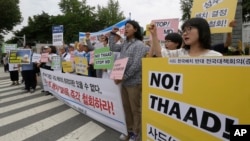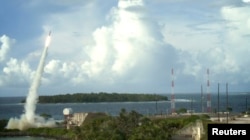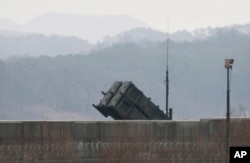Washington and Seoul are moving forward with plans to locate the controversial U.S. THAAD missile defense system on the Korean peninsula, amid growing protests and debate over whether the value of this added deterrence is worth the risk of alienating China and further provoking North Korea.
South Korea’s Defense Ministry announced Wednesday that a site near the southeastern county of Seongju has been selected for deployment of the Terminal High Altitude Area Defense (THAAD) defense system.
“If the THAAD system of the USFK (U.S. Forces in Korea) is operated in Seongju, the safety of our people living in half to two-thirds of the entire Republic of Korea can be protected,” said South Korea Deputy Minister for National Defense Policy Ryu Je-seung.
He also said the location of the THAAD battery will protect important national facilities such as nuclear power plants and strengthen the military capabilities of the South Korea-U.S. alliance.
Speculation that THAAD would likely be located in this region had already sparked protests from groups concerned that the military installation may put their communities in danger.
North Korea’s military on Monday threatened to launch a retaliatory strike against the THAAD deployment by turning the South “into a sea of fire and a pile of ashes.”
More than 5,000 people protested in Seongju on Wednesday. Some 3,000 residents in nearby Chilgok County demonstrated against THAAD on Saturday. Groups are also reportedly planning petition drives to overturn the military’s decision on grounds that the environmental and economic impact of the potential deployment has not been properly vetted.
During his announcement on Wednesday, Deputy Defense Minister Ryu said assessments have been indicating THAAD will create no negative health and environmental impacts in the region and that the safety of the residents would not be in any jeopardy.
System effectiveness
THAAD uses road-mobile launchers and missiles equipped with precise infrared seeking technology to intercept incoming enemy missiles after reentry from high altitude, during their final, or terminal, phase of flight.
This missile defense system in South Korea would be effective against a number of missiles in North Korea’s arsenal, including short-range scuds and medium range Nodong and Musudan missiles.
Critics point out that in Seoul and other areas near the inter-Korean border, THAAD’s effectiveness is limited against some short-range North Korean missiles and artillery that do not travel into the upper atmosphere.
But proponents say THAAD is part of a larger deterrence program needed to counter North Korea’s advancing nuclear and missile capabilities.
“People like to take a look at one particular weapon system, you know, very short range rockets or artillery and say, well, THAAD doesn’t protect against that, so we don’t really need this. But you have to look across the whole spectrum of threats,” said Daniel Pinkston, a North Korea security analyst and lecturer in international relations at Troy University in Seoul.
The South Korean military is also planning to increase its short-range Patriot missile defense system to protect vulnerable areas closer to the border.
China retaliation
China opposes the THAAD deployment and there is growing concern that Beijing may take economic measures to retaliate against South Korea.
Analysts say Beijing is concerned about THAAD’s radar capability to monitor Chinese military installations and about Washington’s increasing military strength in the region.
Beijing’s Foreign Ministry said THAAD “far exceeds the Korean Peninsula defense needs” and “destabilizes the strategic balance of the region.”
The Global Times, a Chinese communist party newspaper, has called for a ban on South Korean products and a travel ban on officials who support THAAD.
There are also concerns that China could limit the number of Chinese tourists to South Korea.
The two countries currently have a free trade pact that permits tariff free exports on a range of goods.
Some in South Korea’s main opposition Minjoo Party of Korea have come out in opposition to THAAD, arguing it would "needlessly" hurt ties with Beijing and Moscow.
There is also concern that THAAD could drive China and Russia to take a softer stand on maintaining sanctions against North Korea for its nuclear program and continued missile tests.
THAAD proponents argue that South Korea cannot compromise on its national security.
“If South Korea can easily be coerced into its changing policy and making itself vulnerable to coercive threats from North Korea, then it helps establish a reputation as being weak and vulnerable and susceptible to coercion,” said Pinkston.
North Korea on Saturday test fired a submarine-based ballistic missile that failed in early flight, one day after Seoul and Washington announced the THAAD deployment.
Last month Pyongyang launched a partially successful test of an intermediate-range Musudan missile that flew approximately 400 kilometers, indicating that the North Korean military had, or is close to developing, the capability to reach U.S. military bases in Asia and the Pacific.
Youmi Kim in Seoul contributed to this report.







